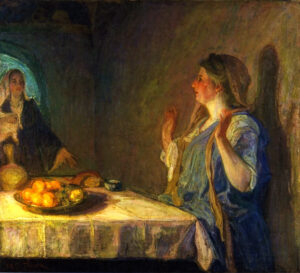Fr Neil’s homily for the Fourth Sunday of Advent, 19 December 2021
Blessed are you among women, and blessed is the fruit of your womb!¹
These words of Elizabeth at the Visitation were triggered by her own baby within her womb leaping for joy at the greeting of Mary. In this encounter, Mary’s role as ‘Mother of God’ is acknowledged. Being attentive to the words of Mary’s greeting opens the heart and soul of the person to encounter the living Lord, the Redeemer.
The Synodal Way speaks consistently about the need to listen. Paying attention then to Mary, the apostles, saints and angels who have stood in the counsel of God and walk closely with our Lord is the best means of illuminating the way of salvation in times of great trial and darkness.
We are reminded that Mary so often hid these moments of wonder in her heart², allowing a reflective contemplation to slowly unfold the deeper mystery of these encounters.
John already is at work bearing witness to the one who is to come, even from his mother’s womb. The unfolding of God’s saving work takes place quietly in small ways, unnoticed by the world yet already blossoming in the hearts of these two women and the lives they carry within their wombs.
It is all too easy to be overwhelmed by the new religion permeating every aspect of our public culture. There is the new doctrine of woke that tolerates no dissenters and will crucify any offenders, at least metaphorically. There are also the new rituals around Covid: vaccinations, testing, hand washing, face-mask wearing, social distancing and self-isolating. Any who are not diligent in their rituals are deemed selfish, deluded, conspiracy theorists. Offenders are to be shunned, shamed, have their freedoms curtailed and eventually be forced into the new rituals.
It is interesting to note that where this thinking has been welcomed into the Church, usually those most liberal towards Church doctrine and liturgy are some of the most fanatical and pharisaical in applying this new religion. It’s like they never really believed in the divine supernatural revelation that calls us into eternal life.
The writer to the Hebrews speaks of the sacrifices and offerings of the old covenant being neither what God desired or takes pleasure in³. If that is how God sees the old covenant that he gave to the people of God, what might he think of this new cult of the present day?
If our attention is distracted by the noise and demands of the present cultural crisis we might just miss what God is doing. Few saw the significance of the Visitation but quietly, in the hill country of Judah, God’s divine presence emerges into our reality. The one carried in Mary’s womb is the “body you have prepared for me;”⁴ and it is this body that will abolish the old covenant and establish the new by “the offering of the body of Jesus Christ once for all.”⁵ This physical offering begins with his incarnation and ends with his ascension.
If we can pay attention to his first coming then we will be all the more ready for his second and his second coming will be of an altogether different order. Christ will be returning with his angels as the triumphant King. This time the world will be shaken and the principalities and powers will be brought to heel. The present earthly powers will be revealed for what they are: temporal, demonic apparitions of madness. For when Christ appears, at the proclamation of his name “every knee should bow, in heaven and on earth and under the earth, and every tongue confess that Jesus Christ is Lord, to the glory of God the Father.”⁶
Therefore let the joy of John and the exultant humble praise of Elizabeth’s words inspire our faith, that we might be ever thankful for the Lord’s work of salvation and look all the more steadfastly to his return — despite the loud cries of the culture of death and despair that surround us at the present time.
¹ Luke 1:42
² Luke 2:19, 2:51
³ Hebrews 10:8
⁴ Hebrews 10:5
⁵ Hebrews 10:10
⁶ Philippians 2:10








 Posts
Posts